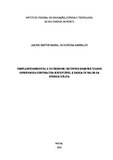Compliance ambiental e fatores ESG: definindo boas práticas de governança corporativa sustentável à cadeia de valor da energia eólica

Data
2022-02-23Autor
Carvalho, Larisse
http://lattes.cnpq.br/9512401093748351
Metadado
Mostrar registro completoResumo
Climate change and the urgent need to change consumption patterns put on the agenda the role of environmental issues in society as a topic of extreme relevance in current debates. Understanding the need to align society and the market with a view to achieve sustainability standards, society are increasingly demanding responsibility from organizations as a way that induces new behaviors. For this, companies need to adapt their business’ role with the intention of promoting sustainable corporate governance and, going further, materialize this intention in good management practices, contemplating environmental, social and governance factors, as well as compliance. Within this logic, the present study aims to investigate sustainable corporate governance tools and strategies based on environmental compliance and Environmental, Social and Govrnance (ESG) factors, establishing a list of good practices for the wind energy value chain through the content analysis of the programs. compliance and sustainability reports from companies that manage wind farms in the state of Rio Grande do Norte. For this, the study developed a systematic mapping of the literature in order to identify sustainable corporate governance tools, focusing on the occurrence of environmental compliance programs. Furthermore, the research proposed an adaptation of the Corporate Sustainability Integration Assessment model developed by Asif (et al., 2011), from which a multiple case study was carried out to do a document content analysis from 03 companies of the wind energy sector. As a result, it was found a list of tools in the literature such as business practices of sustainable governance and the indication of few studies that focus on the subject of environmental compliance, including different perspectives of its application in the business context. Regarding the content analysis of the companies' documents, it was found that the governance of these ones is well structured, but there is a need to reflect on the motivations of the practices oriented to ESG factors, whether due to a real concern with sustainability or an interest in satisfying the market, which demands an ethical behavior in face off environmental and social issues. With the informations, it was created a best practices manual about environmental compliance and ESG factors as the thecnical product of the master’s research.



